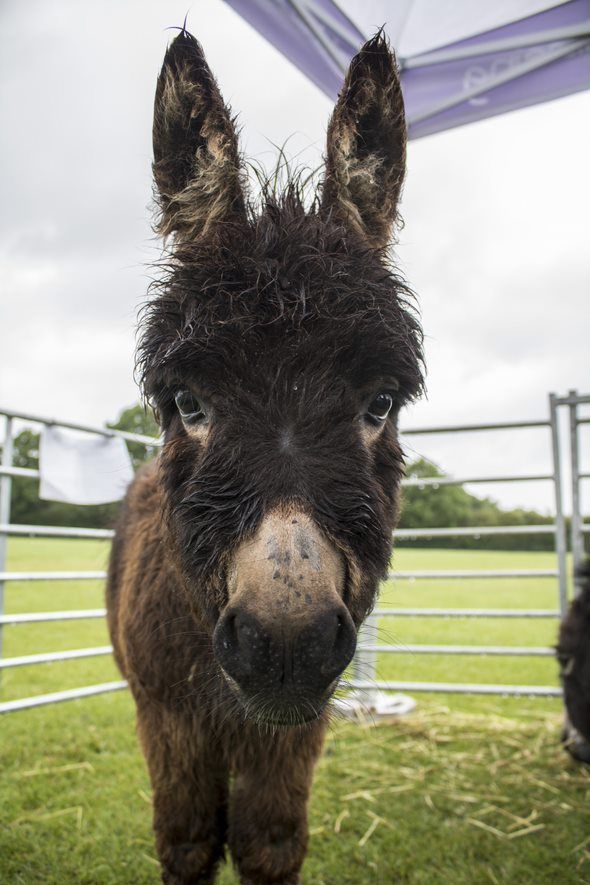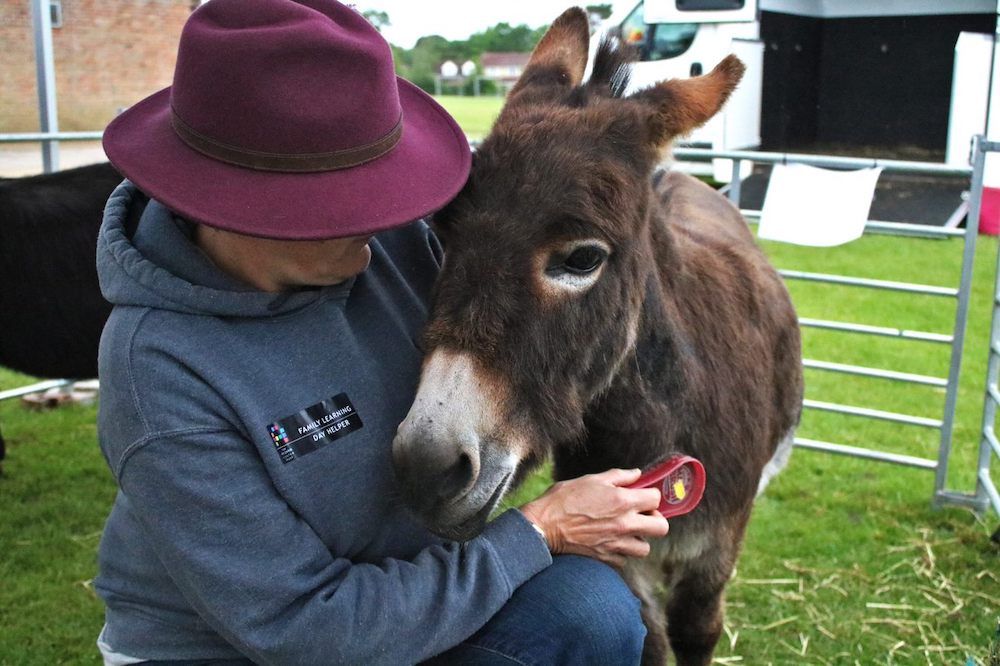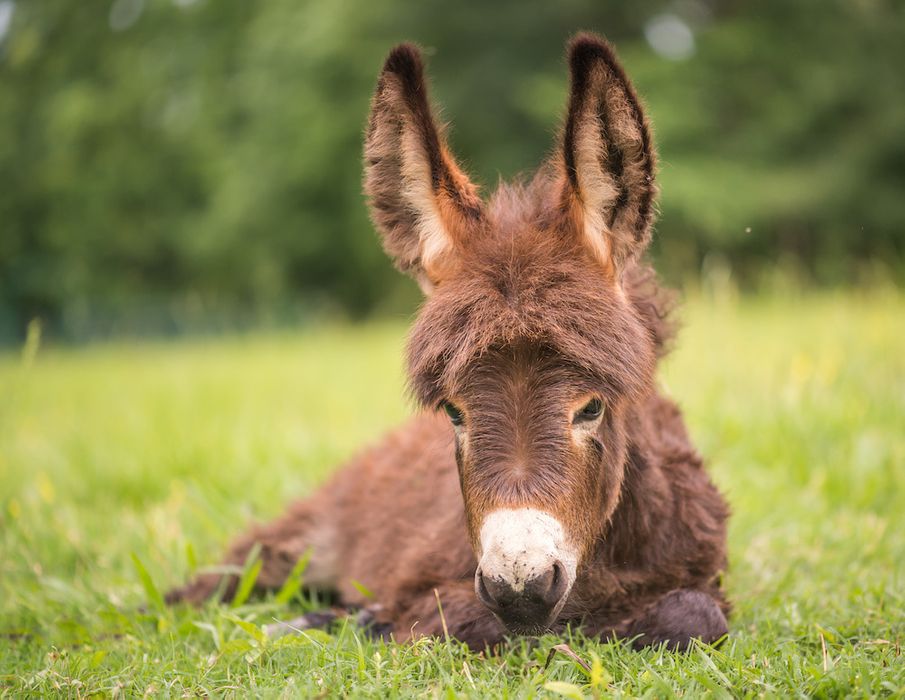Through difficult times, animals have the power to offer relief and companionship. Inspired by her mum’s experience with dementia, Sarah McPherson is the woman behind Miniature Donkeys for Wellbeing – aka Mini Donks – the social enterprise that takes their seven adorable animal companions on wellbeing visits, and changes lives while they’re at it
To cut a long story short... We lost a dog, went looking for puppies, and came back with two miniature donkeys instead.”
Sarah McPherson is casting her mind back to 2017, and the series of events that lead her to found Mini Donks – the social enterprise that takes miniature donkeys into care homes, schools, and hospitals, to support community wellbeing across their home county of Norfolk.
“Bo Peep and Saffy joined the family when my mum was in the early stages of dementia,” Sarah says. “When they were still able to, my folks used to come over and stay with us, and my mum always loved spending time with the donkeys. Then, her dementia got worse, and it became very obvious that my dad was going to be diagnosed with Alzheimer’s and vascular dementia, too.”
Sarah took a three-month leave of absence from her job to try to set up care systems so her parents could stay in their home. During this incredibly difficult time, Sarah found comfort in her two donkeys.

Millie the donkey
“I’d come home, go and sit in the stable, and just spend time with them. Saffron would come and stand with me. I used to just sit and look up at her, and she’d rest her head on my shoulder and give me a big sigh. That was very special.”
As Sarah’s parents’ conditions progressed, they moved to a nearby nursing home. Knowing how much they loved the donkeys, Sarah started to bring the animals on visits with her.
“One of the nursing staff said: ‘There’s a lady who would love to see them, but she’s bedbound. Will they come in?’ I said: ‘Well, we’ll give it a go.’
“Shortly after, we took our two little donkeys to see this lady. And that was the beginning of it all.”
When Sarah’s mum passed away in April 2017, the Monday following her funeral, Sarah handed in her notice at her job, and officially founded Mini Donks.
Since then, the team has grown to seven donkeys and 12 volunteers – and together, they work hard to support and improve the wellbeing of everyone they can in their community.
Why donkeys?
The soothing effect that animals have on our wellbeing is truly incredible, but Sarah thinks there’s something particularly special about donkeys.
“Our girls, they’re inquisitive, they’re bright, but they’re also very gentle. My Pippin, she’s very sensitive to what people need. She’ll suck on my hand, like a child sucking their thumb. It relaxes her and puts her into what seems a dream-like state.
“So if we have somebody who’s end-of-life, or maybe someone with Parkinson’s who’s very shaky, I’ll just gently draw Pippin towards them, while she’s sucking on my hand, and then they can put their hands on her.”
After the visits, Sarah has been told by staff at the hospital that the atmosphere is so much calmer, and Sarah sees first-hand how spending time with the donkeys can soothe stress and anxiety.
Recently, Mini Donks began visiting a secure psychiatric hospital. What began as a one-off visit became every six months, before they were asked to come monthly instead.
They're huge destressers because they're just themselves, and they're very gentle souls
“There’s an adult ward and a children’s ward. The staff and patients say that the best day of the month is donkey day,” says Sarah. “They get to come and groom the donkeys, and we walk around the grounds with them, leading them.
“They’re building a relationship with the donkeys, and one of the young patients saw from our website that it was Pixie’s birthday, so he made a special card for her.”
Touching lives
Sarah has countless stories of the people who have been touched by the work that they’re doing with Mini Donks. But when she reflects on her time working with organisations in her community, one story in particular stands out in her memory.
“There’s a chap who we met at a nursing home in North Norfolk, which caters for people with very severe dementia. He was non-verbal, and he suffered from a shuffling gait – so he shuffled with his hands curled up in fists against his chest.
“A careworker brought him in to the pen with the donkeys, and they very gently took his hand. As his hand went down on to the back of the donkey, he opened up and started stroking. I put a brush in his hand and he begin to hum.
“He groomed that donkey like a professional. He went from behind the ears, down the neck, along the back, down by the sides, down all four legs, then looked around, saw the other donkey, shuffled over, groomed the other donkey. Then he put the brush back in our hands, and off he went.”
A year on, Sarah and the donkeys went back to visit the same nursing home.
“He was still there, but much worse. He was asleep in a chair, and the care staff very gently woke him up. He looked up, took the donkey’s face in his hands and kissed it.”
Sarah explains how the five or so minutes that people spend with the donkeys can make all the difference to their wellbeing, and creating these moments is at the heart of what Mini Donks do.

Sarah enjoying a cuddle with one of her donkeys
“My dad has got severe dementia, and he doesn’t always know who I am,” says Sarah. “He doesn’t care much for donkeys, but if something reached him the way that the donkeys reach these people, I would be delighted.”
Behind the scenes
The work that Mini Donks does is propelled forwards by 12 volunteers, who give up their time to take care of the donkeys, and come along on wellbeing visits. But for Sarah, and the others who support their mission, the work they do also supports their own mental health.
“It’s been a saviour for my mental wellbeing,” Sarah explains. “And a lot of our volunteers come to us because they want something for themselves, to help them with their wellbeing.
“People have come to us lacking in confidence, and with anxiety issues. But being around the donkeys, and them being a facilitator to help the donkeys help somebody else, is a really powerful thing.”
But despite being the driving force behind the social enterprise, Sarah is quick to step out of the spotlight.
“I know it was my idea, but it’s so much more than me – it’s this amazing team, and it’s the power of positivity. If anybody is feeling low, doing something to help somebody else can be a lot easier than doing something to help yourself – but, in fact, you’re doing both at the same time.”
It's so much more than me - it's this amazing team, and it's the power of positivity
A measure of success
From the people that they visit, to the team behind the scenes whose lives are brightened by the work that they do, Mini Donks is the social enterprise filling the small moments in people’s lives with joy and comfort. And for Sarah, all the hard work is more than worth it.
“I haven’t gone to bed for two years without thinking about donkeys,” says Sarah, as she reflects on what drives her. “But when I worked for an agency, advising on how to create successful start-up businesses, the chief exec said we need to ask clients: ‘What does your perfect day look like, and how is your business going to give you more of your perfect day?’ My perfect day is messing about with my donkeys, and giving other people their perfect days, so I’m the most successful person you could ever meet.”
Discover more about the work that Mini Donks do by visiting their website, minidonks.org.uk


Comments